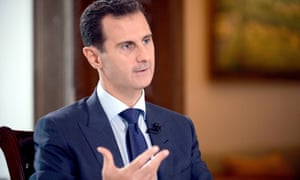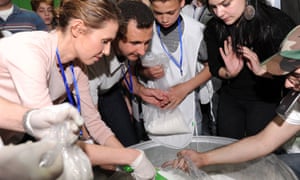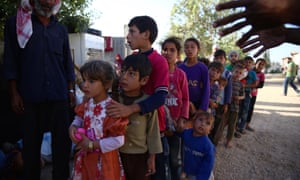-

UN pays tens of millions to Assad regime under Syria aid programme
Exclusive: Guardian analysis shows series of contracts awarded to government and charities linked to president’s family

The UN says it must work with the Syrian regime, led by Bashar al-Assad, to reach vulnerable civilians. Photograph: Sana Handout/EPA Nick Hopkins and Emma Bealsrded contracts worth tens of millions of dollars to people closely associated with the Syrian president, Bashar al-Assad, as part of an aid programme that critics fear is increasingly at the whim of the government in Damascus, a Guardian investigation has found.Businessmen whose companies are under US and EU sanctions have been paid substantial sums by the UN mission, as have government departments and charities – including one set up by the president’s wife, Asma al-Assad, and another by his closest associate, Rami Makhlouf.copy https://www.theguardian.com/world/2016/a
The UN says it can only work with a small number of partners approved by President Assad and that it does all it can to ensure the money is spent properly.
“Of paramount importance is reaching as many vulnerable civilians as possible,” a spokesman said. “Our choices in Syria are limited by a highly insecure context where finding companies and partners who operate in besieged and hard to reach areas is extremely challenging.”
However, critics believe the UN mission is in danger of being compromised.
They believe aid is being prioritised in government-held areas and argue UN money is effectively helping to prop up a regime responsible for the deaths of hundreds of thousands of its own citizens.
UN insiders admit the relief mission in Syria is the most expensive, challenging and complex it has ever undertaken.
But the contentious decisions it has had to make are now exposed for the first time by a Guardian analysis of hundreds of contracts it has awarded since the operation began in 2011.
This shows that:
- The UN has paid more than $13m to the Syrian government to boost farming and agriculture, yet the EU has banned trade with the departments in question for fear of how the money will be used.
- The UN has paid at least $4m to the state-owned fuel supplier, which is also on the EU sanctions list.
- The World Health Organisation has spent more than $5m to support Syria’s national blood bank – but this is being controlled by Assad’s defence department. Documents seen by the Guardian show funds spent on blood supplies came directly from donors who have economic sanctions against the Syrian government, including the UK. They also show the WHO had “concrete concerns” about whether blood supplies would reach those in need, or be directed to the military first.
- Two UN agencies have partnered with the Syria Trust charity, an organisation started and chaired by President Assad’s wife, Asma, spending a total of $8.5m. The first lady is under both US and EU sanctions.
- Unicef has paid $267,933 to the Al-Bustan Association, owned and run by Rami Makhlouf, Syria’s wealthiest man. He is a friend and cousin of Assad, and his charity has been linked to several pro-regime militia groups.
- Makhlouf runs the mobile phone network Syriatel, which the UN has also paid at least $700,000 in recent years. Makhlouf is on the EU sanctions list and was described in US diplomatic cables as the country’s “poster boy for corruption”.
- Contracts have been awarded across UN departments with companies run by or linked to individuals under sanctions.
On top of this, analysis of the United Nations own procurement documents show its agencies have done business with at least another 258 Syrian companies, paying sums as high as $54m and £36m, down to $30,000. Many are likely to have links to Assad, or those close to him.
The UN says that its relief work has already saved millions of lives and argues it has to work with the regime if it wants to operate in Syria.

Bashar and Asma al-Assad help pack aid supplies with volunteers at a food distribution centre in Damascus. Photograph: -/AFP
It highlights the money it has spent putting up staff at the Four Seasons hotel in Damascus as a case in point.
UN agencies paid $9,296,325.59 to the hotel in 2014-15 – which is understood to still be one-third owned by Syria’s ministry of tourism, a department outlawed under EU sanctions.
The hotel is deemed the safest place for UN personnel to stay in the Syrian capital.
“Operating in Syria, with the conflict now entering its sixth year, forces humanitarians to make difficult choices,” a UN spokesman said.
“When faced with having to decide whether to procure goods or services from businesses that may be affiliated with the government or let civilians go without life-saving assistance, the choice is clear: our duty is to the civilians in need.”
The UN also points out it does not have to abide by EU or US sanctions. It only needs to abide by UN sanctions.
But one serving UN official told the Guardian there was unease within some of its agencies about the grip Assad’s government has on the relief effort.
The official, who has worked extensively inside Syria, said that while operating inside the country was challenging, the UN’s position was disappointing. Another said that all conflicts presented difficult working conditions but the “situation in Syria just doesn’t happen anywhere else”.
Another UN official who worked in Damascus early in the conflict told the Guardian: “The UN country team knew from the early days of the conflict that neither the government nor its authorised list of local associations for partnership with the UN could be considered as befitting the humanitarian principles of independence, neutrality and impartiality.
“This important consideration was stepped aside by the UN to satisfy the government’s leadership demand for the humanitarian response. This set the tone for UN entanglement with entities closely associated with the government.”

Syrian children queue to receive aid. Photograph: Abd Doumany/AFP
Sources also describe a worrying “culture of silence” about the internal workings of the UN’s Damascus operation.
Dr Reinoud Leenders, an expert in in war studies based at King’s College in London, said the UN needed to rethink its strategy because it had become too close to the regime.
“UN officials argue that given the complex and often dangerous realities in which they are expected to provide aid, some concessions and accommodation of the government’s demands are inevitable. Yet ... the UN’s alleged pragmatism has long given way to troubling proximity to the regime.”
Leenders said UN agencies had paid “lucrative procurement contracts to Syrian regime cronies who are known to bankroll the very repression and brutality that caused much of the country’s humanitarian needs”.
The academic has interviewed many independent aid workers for a study on Syria. They told him some UN officials were displaying signs of “clear-cut Stockholm syndrome”.
A senior member of the humanitarian community who leaked information to the Guardian said: “There are obviously questions over some of these UN procurements.
“But at least the UN publishes the names of their suppliers. Many of the international NGOs won’t even do that. Very limited transparency is a problem that affects the whole aid effort in Syria. Given that the aid industry has been talking [about] the need for more transparency for decades, it’s high time we had proper independent scrutiny of where this money is going and how it is being spent.”
In June, the Syria Campaign accused the UN of breaching its principles in the conflict by effectively letting the government control aid deliveries.
More than 50 humanitarian, human rights and civil society groups back a report which said the UN had given in to demands not to help rebel-held areas, contributing to the death of thousands of civilians.
The report said the Assad government controlled aid by threatening to remove the UN’s permission to operate within Syria.
“The Syrian government has used this threat consistently since then to manipulate where, how and to whom the UN has been able to deliver humanitarian aid,” it adds.
Assinar:
Postar comentários (Atom)
Postagem em destaque
Ao Planalto, deputados criticam proposta de Guedes e veem drible no teto com mudança no Fundeb Governo quer que parte do aumento na participação da União no Fundeb seja destinada à transferência direta de renda para famílias pobres
Para ajudar a educação, Políticos e quem recebe salários altos irão doar 30% do soldo que recebem mensalmente, até o Governo Federal ter f...
-
更新时 秘鲁主要金矿开采区数千名矿工举行示威,抗议当局实施严厉措施,打击非法采矿。 根据政府实施的新规定,非法采矿...
-
Aqui no Não Curto você pode ver todos os programas da Rede Globo ao vivo e online. De segunda a segunda a programação completa da emissor...
-
Delação de Léo Pinheiro, da OAS, envolve Aécio e Geddel A delação premiada de um dos principais investigados na Lava Jato, o execu...
Nenhum comentário:
Postar um comentário